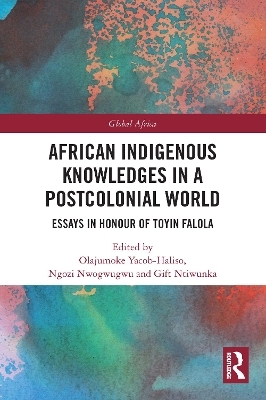
African Indigenous Knowledges in a Postcolonial World
Routledge (Verlag)
978-0-367-52885-0 (ISBN)
The contributors engage the unresolved problematics of the historical and contemporary linkages between African knowledges and the African academy, and between African and global knowledges. The book relies on historical and comparative political analysis to explore the global context for the application of indigenous knowledges for tackling postcolonial challenges of knowledge production, conflict and migration, and women’s rights on the continent in transcontinental African contexts.
Asserting the enduring potency of African indigenous knowledges for the transformation of policy, the African academy and the study of Africa in the global academy, this book will be of interest to scholars of African Studies, postcolonial studies and decolonisation and global affairs.
Olajumoke Yacob-Haliso is Professor of Political Science at Babcock University, Nigeria. Ngozi Nwogwugwu is Senior Research Fellow at the Nigerian Institute for Legislative and Democratic Studies (NILDS) and Senior Lecturer in the Department of Political Science and Public Administration at Babcock University, Nigeria. Gift Ntiwunka is Associate Professor of Public Administration and Gender Studies in the Department of Political Science and Public Administration, Babcock University, Nigeria.
1. Introduction: Global Africa, Postcoloniality and Indigenous Knowledges Part One: African Knowledges in the African Academy 2. Sociology in Africa: Between Domestication and Indigenization 3. Rethinking the Neo-Liberal Agenda: Sokoto Caliphate Political Thought as Alternative 4. Women Academics and Historiography in the Nigerian University 5. Indigenous Strategies and Settings for Peace Education and Values among the Yoruba Part Two: Indigenous Conflict Resolution Systems 6. African Youths and Indigenous Approaches to Resolving Conflicts in Africa 7. Indigenous Knowledge System of Conflict Resolution in Africa: Sudanese Peace Processes, 1970–2011 8. Pre-Colonial Diplomacy in Igbo Land: Rationale, Means and Benefits Part Three: Transnational Gender Policy and Women’s Rights 9. Transnational Funding for Women’s Rights Advocacy on Affirmative Action in Nigeria 10. Gender Inclusion and the Implementation of Fadama III in Abuja, Nigeria 11. Patriarchy, Feminism and the African Woman’s Quest for Happiness in Aidoo’s Changes and Emecheta’s The Joys of Motherhood 12. Indigenous Household Menu Production and Food Security: A Paradigm Shift Part Four: Media and Political Discourses 13. Beyond the Failing Justice System: The Emerging Confluence of Mob Justice and the Social Media in Nigeria 14. Of Discourse: Politics and the Nigerian Woman 15. Wisdom-Imbecility Manipulation: Theorizing Political Communication Trends in Northern Nigeria Part Five: African and Global Migration Management 16. The Influx of Igbo Migrants and Intergroup Relations in Zaria, 1900–1965 17. Globalisation and African Migration to Libya 18. The Paradox of Regional Migration Management: The AU and EU Joint Africa Partnership Agreement
| Erscheinungsdatum | 20.07.2023 |
|---|---|
| Reihe/Serie | Global Africa |
| Zusatzinfo | 11 Tables, black and white |
| Verlagsort | London |
| Sprache | englisch |
| Maße | 156 x 234 mm |
| Gewicht | 480 g |
| Themenwelt | Geisteswissenschaften ► Philosophie ► Erkenntnistheorie / Wissenschaftstheorie |
| Naturwissenschaften ► Geowissenschaften ► Geografie / Kartografie | |
| Sozialwissenschaften ► Politik / Verwaltung ► Vergleichende Politikwissenschaften | |
| Sozialwissenschaften ► Soziologie ► Spezielle Soziologien | |
| ISBN-10 | 0-367-52885-1 / 0367528851 |
| ISBN-13 | 978-0-367-52885-0 / 9780367528850 |
| Zustand | Neuware |
| Haben Sie eine Frage zum Produkt? |
aus dem Bereich


![Was heißt Denken?. Vorlesung Wintersemester 1951/52. [Was bedeutet das alles?] - Martin Heidegger](/media/113619842)